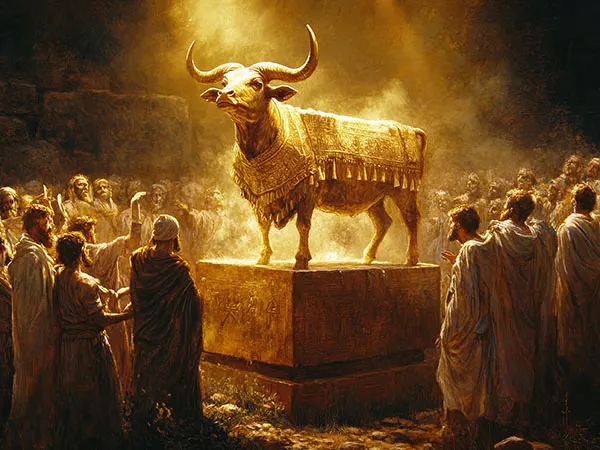Filter by Categories
Syncretismas!
Article by Martin G. CollinsChristmas, as it is celebrated today, represents a syncretistic blend of pagan rites and Christian themes, a mixture that is abhorrent to God. This holiday, flourishing in the materialistic Western world, has origins rooted in non-Christian traditions, drawing from ancient Babylonian practices involving figures like Nimrod and Semiramis, who were worshipped under various names across different cultures. Their rituals, tied to the winter solstice and symbolized by evergreen trees and gift-giving, were later merged with Christian elements during the fourth century under Emperor Constantine, who aligned the pagan festival of the sun god's birth with the celebration of the Son of God on December 25. This blending continued as the Roman Catholic Church officially designated this date for observing Christ's birth in the fifth century, adopting the day of the old Roman feast of Sol. In England, Pope Gregory I instructed missionaries to incorporate pagan practices into Christianity, further mixing traditions like the ancient Angli festival on December 25 with Christian observance. Over time, additional pagan ceremonies were introduced, despite opposition during the Reformation and Puritan eras, which sought to suppress these elements. In America, German and Dutch settlers brought customs such as the Christmas tree and St. Nicholas, integrating them into the holiday, which eventually became a national celebration marked by ancient pagan practices of feasting and gift-giving. This syncretism, evident in the holiday's history and customs, diverts focus from the spiritual truths God desires, leading instead to self-gratification and behaviors contrary to His will.
Fishy Syncretism
Commentary by Martin G. CollinsThe Philistines were a thorn in the sides of God's people all the way back to Abraham. Later, they continued their torment as a bitter enemy of the Israelites. Samson's epic story, in about the 12th century BC, ended with him dying while destroying the Philistines' temple of Dagon. A few years later, the Philistines attacked the Israelites and took the ark of the covenant; and again, Dagon, the god of the Philistines was a central figure. The Philistine fish god Dagon was an abomination to the God of Israel. God warns us that we are not to make or wear or use any symbol, image, icon, or emblem to represent Him or His church. No cross, no fish, and no Triquetra (i.e., Trinity knot). satan puts his mark on his counterfeit Christianity to claim and identify it as his. Since that is a fact, why would any authentic Christian identify himself with satan's counterfeit Christianity by using its symbols? Knowing the truth, an authentic Christian would not.

Christmas, Syncretism, and Presumption
'Personal' from John W. RitenbaughAdding to or subtracting from God's Word through the celebration of Christmas exemplifies syncretism, an attempt to merge foreign practices with the truth without determining if God would permit it. This syncretistic inclusion begins to dilute the purity of the God-given religion, and before long, other barriers fall, leading to a tolerance where absolutes become passé and perversions commonplace. Christmas, introduced into Christianity centuries ago as a ploy to win converts from paganism, represents a deliberate grab for power rather than a promotion of the true God and His way of life, leading people away from the truth. Scripture clearly shows that such additions are a snare, vanity, and spiritual death, emphasizing that God does not want us to presume we can alter His Word by incorporating practices like Christmas into worship. Once the truth is known, it becomes our responsibility to step away from such traditions, ensuring we do not let human proclivity lead us away from God and the future He has prepared for us.
Spirit and Truth
CGG Weekly by David C. GrabbeIn the ongoing cultural conflict over Christmas, a deceptive trap is set where neither side holds the truth. On one pole are the secularists, who aim to erase God from their lives. On the other pole are Christians who embrace syncretism, believing it is an acceptable form of worship by blending pagan practices with the worship of God. This fusion of traditions, however, strays from the specific ways in which God has instructed His people to honor Him. God warns against adopting pagan customs under the guise of worshipping Him, emphasizing that such practices are not worshipping in spirit and in truth. Thus, regardless of the outcome of this cultural battle, the trail of deception reveals the true influence behind these conflicting lies.

Cogitations on Christmas
Article by Richard T. RitenbaughChristmas is steeped in contradictions, particularly through the practice of syncretism, where pagan traditions are blended with the celebration of Jesus Christ's birth. In the early fourth century, the Catholic Church combined the Roman winter solstice festival, Saturnalia, with a commemoration of His birth to ease new converts into Christianity, despite the fact that Jesus was not born on December 25. The term "Yule," an alternate name for the season, originates from a pagan midwinter festival, and practices like the Yule log trace back to heathen customs of driving away evil spirits with bonfires on the winter solstice night. This blending of traditions continues because human nature justifies self-contradictory practices for the sake of enjoyment and perceived benefit, even when they conflict with truth. On one side, secularists reject God's presence in their lives, while on the other, mainstream Christians accept syncretism as a valid form of worship, yet both paths diverge from worshipping God as He desires.
Reasons for Not Celebrating Christmas
CGG Weekly by John ReissWhy do we not keep Christmas? Jesus was not born on December 25, during Saturnalia, a pagan festival. It is a commercialized holiday rife with lies.

Is New Year's Eve a Pagan Holiday?
'Ready Answer' by Mike FordNew Year's Eve may seem like an innocuous, secular holiday, but it, too, has ties to ungodly, pre-Christian customs and religious practices.

The Plain Truth About Christmas
Herbert W. Armstrong BookletDid Christmas come from the Bible or paganism? Here are the origins of the Christmas tree, Santa Claus, mistletoe, the holly wreath, and exchanging gifts.

Presumption and Divine Justice (Part One)
'Personal' from John W. RitenbaughOrthodoxy in virtually every aspect of life has been discarded, indicating how perverse human nature is in its determination to rebel against God.
What's Wrong With Christmas?
Sermon by Martin G. CollinsThe Catholic Church mixed truth and falsehood to have the 'official' birthdate of the Son of God coincide with the rebirth of the sun, the winter solstice.
Christmas and Sun Worship
Sermonette by Mike FordChristmas, Easter, and Halloween all derive from sex, fertility, and sun worship. Christmas traces to the incestuous relationship of Semiramis and Nimrod.
The Cross: Christian Banner or Pagan Relic?
Article by Earl L. HennIs it alright to wear a crucifix? As it turns out, the cross was a pagan worship symbol long before Christ's death, and was never used by the first century church.

A Day of Lust, Not Love
Article by Martin G. CollinsValentine's Day, firmly rooted in paganism, concentrates on lust and sexual immorality, which are contrary to the way of life that pleases God.
Satan's Pagan Holy Days
Feast of Tabernacles Sermon by Kim MyersNew Years, Christmas, Easter, Halloween and birthdays all originate in paganism. Satan entices many into accepting these pagan practices through emotional appeals.
Is Valentine's Day Really About Love?
Commentary by Martin G. CollinsSt. Valentine's Day started as a lewd, sensual, pagan festival in Rome. Lupercalia is a rite connected with fertility, honoring Venus, the goddess of sex.
Truth-Based Worship Vs Spiritual Confusion
Sermon by Martin G. CollinsGod never accepts worship that comes from human reasoning and the traditions of man. The starting point for worship must always be God and His revelation.

Nicolaitanism Today
'Prophecy Watch' by Richard T. RitenbaughThe end-time church is warned against Nicolaitanism, for it exists today. The Scriptures, plus some first century history, reveal who the Nicolaitans are.
The Woman Atop the Beast (Part 1)
'Prophecy Watch' by Richard T. RitenbaughRevelation 17 depicts a fallen woman astride a beast, drunk with the blood of God's saints. Whom does this image represent? History makes the answer plain!
Easter 2017
Commentary by Richard T. RitenbaughThe world's churches have adopted the fertility symbols of Easter bunnies, Easter eggs, and the traditional Easter ham from pagan, pre-Christian rituals.
Why Passover and Not Easter?
CGG Weekly by Richard T. RitenbaughThe Catholic Church did not forbid keeping the Passover until AD 325. The controversy over Passover or Easter boils down to following Scripture or Roman tradition.
Sincerity Without Truth Is Worthless
Sermon by Martin G. CollinsIt is dangerous to judge something on the basis of apparent 'sincerity,' which is often the opposite of godly sincerity. Godly sincerity is paired with the truth.
Is Mary Worthy of Worship?
Article by David C. GrabbeThe Catholic Church places great importance on Mary, to the point that many Catholics are pushing for Mary to be recognized as 'Co-Redemptrix!
True Worship of God
Sermonette by Craig SablichAny practice that does not give its loyalty to the Creator and is not devoted to His truth is nothing more than a method of worship created by men.
Strategies for Interfacing with Babylon without Becoming Assimilated (Part Five)
Sermon by David F. MaasGod is not a closed triangular Trinity, but a family consisting of God the Father and God the Son, and will include billions of resurrected, glorified saints.
To Be, or Not To Be, Like Everyone Else?
Sermon by Martin G. CollinsTo keep from being swept up in the bandwagon effect of compromising with sin, we must make sure our convictions are not merely preferences.

Prepare to Meet Your God! (Part Five): Religion and Holiness
Article by John W. Ritenbaugh and Richard T. RitenbaughThe prophet Amos exposes the ancient Israelites' religion as syncretic, a blend of God's way and paganism, corresponding to this world's Christianity.
America's Goddess (Part Two)
Commentary by Martin G. CollinsPresident Grover Cleveland called the Statue of Liberty the United States' "peaceful deity—greater than all gods." Wiccans pray to her as a nature goddess.
Hosea's Prophecy (Part Four)
Sermon by Martin G. CollinsBoth Israel and Judah during Hosea's time adopted paganism from the surrounding nations. Syncretistic religion blends paganism and Christianity.
Truth (Part 1)
Sermon by John W. RitenbaughIf we are going to search for truth, we should not be seeking it in the philosophies of men, but rather in the fullness of truth found in God's revelation.

Psalm Genres (Part Three): Messianic
Sermon by Richard T. RitenbaughThe Messianic Psalms serves as a powerful corrective to shallow or misguided views of Christ fostered by nominal Christianity.
Liberalism and Today's Christianity
Commentary by John W. Ritenbaugh (1932-2023)The Beast will deceive countless numbers of people, as can be illustrated by the recent syncretistic admixture of Christianity and Islam known as Chrislam.

'After Three Days'
Booklet by Richard T. RitenbaughA scriptural explanation of the time of Christ's death, burial and resurrection, showing that He died on a Wednesday and rose from the dead on the Sabbath.
One Nation Under God (Part Two)
Feast of Tabernacles Sermon by Martin G. CollinsWe need to follow Nehemiah's example in submitting to God, focusing on the right goals, having wisdom in handling complex situations, and having courage.